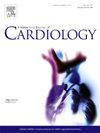基因检测对一大批小儿心肌病患者的临床影响。
IF 3.2
2区 医学
Q2 CARDIAC & CARDIOVASCULAR SYSTEMS
引用次数: 0
摘要
背景:与成人发病型心肌病(aCM)相比,小儿心肌病(pCM)具有更早的渗透性和不同的表现性,但能解释这一现象的数据却很有限。此外,基因型与 pCM 结果之间的关系也没有得到很好的描述:我们比较了一组 aCM 和一组 pCM 的基因型,从而提出了关于 pCM 早期渗透性和表现性的假设。最后,我们报告了如何利用基因检测来指导 pCM 的遗传咨询:在 pCM 中,感兴趣变体(VOI)的比例为 53.7%,其中 24.2%携带两个 VOI。在 pCM 中,新变异占 VOI 的 11%,在限制性 pCM 中占 50%。诊断年龄小于 1 岁(HR = 2.07,p = 0.029)、限制性表型(HR = 2.87,p = 0.03)和存在两个 VOI(HR = 2.97,p = 0.001)是导致死亡或心脏移植的独立危险因素。与 aCM 相比,pCM 患者更常携带两个 VOI(p = 0.02)或新变异(p = 4.10-13)。此外,VOI 的分布在 aCM 和 pCM 中也有所不同。pCM 的基因分型改善了家庭的遗传咨询,并促成了十次产前诊断:结论:基因检测为 pCM 的早期渗透提供了线索。结论:基因检测为 pCM 的早期渗透性提供了线索。CM 患儿体内存在两个 VOI 是发生严重和早期心脏事件的风险因素。本文章由计算机程序翻译,如有差异,请以英文原文为准。
Clinical impact of genetic testing in a large cohort of pediatric cardiomyopathies
Background
There are limited data that can explain the earlier penetrance and the different expressivity of pediatric cardiomyopathy (pCM) compared to adult-onset cardiomyopathy (aCM). In addition, the relationship between genotype and pCM results is poorly described.
Objective
We compared the genotypes between a cohort of aCM and a cohort of pCM to propose hypotheses on the earlier penetrance and expressivity of pCM. Finally, we report how genetic testing was used to guide genetic counseling in pCM.
Methods
253 pCM (<18 years old) and 1466 aCM patients were sequenced on a panel of 67 cardiomyopathy genes. Risk factors for death and heart transplantation were analyzed.
Results
In pCM, the variant of interest (VOI) yield was 53.7 % including 24.2 % carrying two VOI. De novo variants represented 11 % of VOI in pCM and 50 % in restrictive pCM. An age at diagnosis younger than 1 year (HR = 2.07, p = 0.029), restrictive phenotype (HR = 2.87, p = 0.03) and the presence of two VOI (HR = 2.97, p = 0.001) were independent risk factors for death or heart transplantation.
In comparison with aCM, pCM patients harbored more frequently two VOI (p = 0.02), or de novo variants (p = 4.10−13). In addition, the distribution of VOI was different in aCM and pCM. Genotyping of pCM improved genetic counseling in families and led to ten prenatal-diagnosis.
Conclusions: Genetic testing provides clues for earlier penetrance of pCM. The presence of two VOI in children with CM is a risk factor for severe and early cardiac events.
求助全文
通过发布文献求助,成功后即可免费获取论文全文。
去求助
来源期刊

International journal of cardiology
医学-心血管系统
CiteScore
6.80
自引率
5.70%
发文量
758
审稿时长
44 days
期刊介绍:
The International Journal of Cardiology is devoted to cardiology in the broadest sense. Both basic research and clinical papers can be submitted. The journal serves the interest of both practicing clinicians and researchers.
In addition to original papers, we are launching a range of new manuscript types, including Consensus and Position Papers, Systematic Reviews, Meta-analyses, and Short communications. Case reports are no longer acceptable. Controversial techniques, issues on health policy and social medicine are discussed and serve as useful tools for encouraging debate.
 求助内容:
求助内容: 应助结果提醒方式:
应助结果提醒方式:


